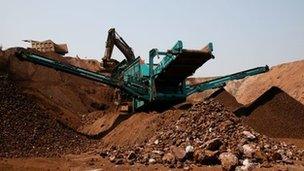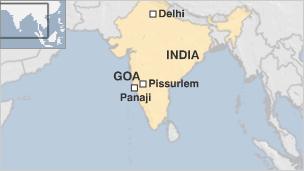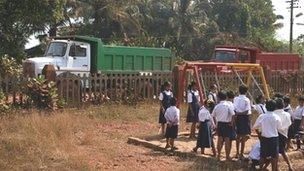India's controversial iron mining boom
- Published
On the crest of a north Goan hill is a view few tourists see - only an hour's drive from its world-famous beaches.
Far into the distance, its forested hills are scarred by giant mining pits, some hundreds of metres deep.
An army of machines claw at the sides, digging out iron ore to feed Goa's mining boom.
It is not for India though - despite its huge need for steel - but for export, with most of it going to China.
This is a goldrush for a globalised age.
But Goa's mining business is now having to dig in itself: It is the latest target of India's anti-corruption drive, with a government commission due to report soon on allegations of widespread abuses.
Some critics are calling for the industry to be closed down.
Bumper profits
The controversy is also prompting questions over how India is managing its mineral reserves - when it has such urgent needs to upgrade its own infrastructure.

Activists claim dust and other pollution from mining operations is causing breathing difficulties in children
But when Beijing won the 2008 Olympics, China's surging demand for steel was too good an opportunity for Goa's iron ore industry to miss.
And Indian steelmakers so far have not developed the technology to handle the lower grade ore found in the state.
But with bumper profits from China have come charges of rampant over-mining, environmental devastation and widespread corruption.
The Indian media accuse local Goan officials of turning a "Nelson's eye" to it all, with headlines like "Pits of Corruption".
It could have a political toll, with the state under the sway of India's ruling Congress party.
Activists claim dust and other pollution from mining operations is causing breathing difficulties in local children.
At the Taraada Surla primary school, children play just feet away from trucks carrying iron ore from the mines.
A red hue from the dust soon clings to their uniforms - the clothes paid for by one of the local mining companies.
Widespread illicit mining
There are also concerns over the fate of Goa's dwindling tiger population.

"We used to hear the roar of the tigers, now we hear the roar of the trucks," claims Ramesh Gauns, a local activist and teacher.
Campaigners say the mining lobby has been resisting efforts to give the tigers better protection, because of rich iron ore seams near their reserves.
Several mines "would have to close", an industry-insider admits, if a proposed 10km (6 miles) buffer zone around the Mhadei tiger reserve is enforced.
Goa's $4.5bn (£2.8bn) a year iron-ore industry is now in crisis mode, attempting a rapid image brush-up.
Mining companies fear the government commission, under retired judge MB Shah, could go as far as recommending a complete stop to iron ore exports.
It has already happened to the mining industry in the next door state of Karnataka.
There the chief minister - from the opposition BJP - has been arrested for allegedly allowing widespread illicit mining.
Public relations advisers have been flown in from Mumbai, flourishing figures of how many jobs mining generates in Goa - 75,000 they say - and how much cash it puts into state coffers - which they calculate to be $320m (£200m) a year.
'Destruction of Goa'
While admitting there have been violations which have to be "addressed", mine industry spokesman Ambar Timblo says it would be "economically cataclysmic" for the state if iron ore extraction was stopped.

School children play just feet away from trucks carrying iron ore from the mines
Ramesh Gauns is unimpressed.
All mining in Goa should halt he says, and the industry should use its huge profits to compensate anyone who loses their job.
He says it makes no sense to be selling so much of its mineral wealth abroad, "making China a superpower, at the cost of the destruction of Goa".
What is more, Goa has several steel plants of its own - but without the capacity to use the state's own iron ore, they import all their raw materials from outside.
For now, the corruption allegations are top of the agenda.
But the bigger question may be whether India is making best long-term use of its own resources.
- Published6 October 2011
- Published18 April 2012
- Published5 September 2011
- Published21 July 2011
- Published12 August 2011
- Published2 August 2011